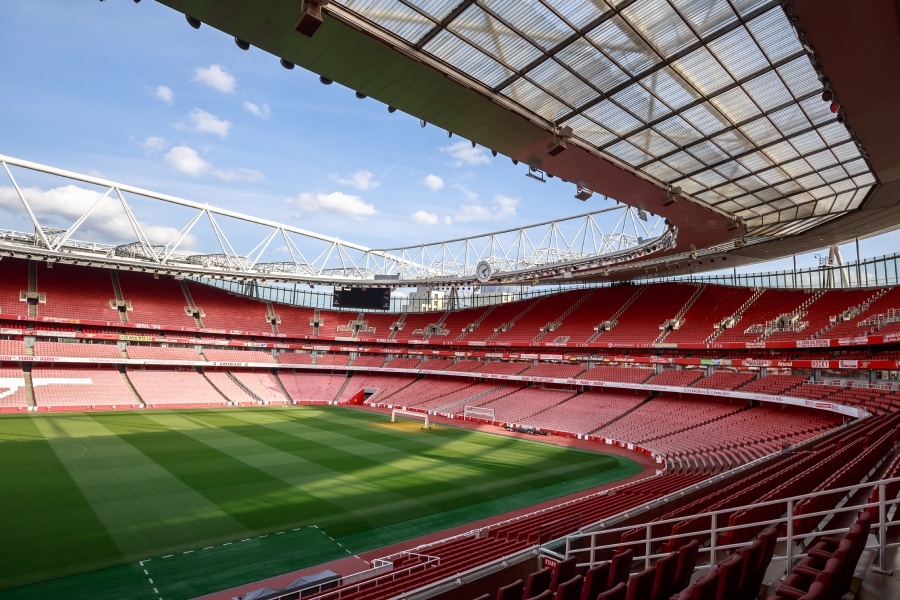- Arsenal Track Bournemouth Star Eli Junior Kroupi
- Arsenal linked with summer move for Kees Smit
- Arsenal Join Race for Dortmund Left-Back Svensson
- Pundit claims Arsenal players don’t trust Viktor Gyokeres
- Arsenal ‘pushing hard’ to sign Julian Alvarez
- Arsenal hold talks to sign Palmeiras teen Eduardo Conceicao
- Arsenal linked with summer move for Leon Goretzka
- Arsenal and Chelsea monitor Breno Bidon situation
- Arsenal track Ajax Amsterdam winger Mika Godts
- Arsenal ‘in the mix’ to sign Bayern Munich’s Lennart Karl
How iGaming Brands Are Shaping Modern Football Sponsorships
The Role of iGaming Brands in Football
Football is one of the most entertaining and rich industries in the world with hundreds of millions of dollars paid for transfers and millions of people watching competitions each year. The football market is valued at around $30-$32 billion in 2024-2025 and projected to grow 7-10% by 2030. But what about the iGaming market? Is it bigger? And how does it evolve over time? You will be surprised to know that the global iGaming market is two-three times bigger than the overall football landscape. Totaling at 97 billion by the end of 2024, it still has a big potential for growth. Some analysts say that it will grow by 30% by 2027.
But how do these two worlds connect, and how do they affect one another? At some point, the iGaming world was fueled by the football competitions allowing sports fans to engage more by placing bets on their favorite team which made their fan experience even deeply connected to their favorite team’s performance. But now when the iGaming industry almost tripled the value of the football industry, it started to affect it with different sponsorships, deals, and marketing budgets. It is changing the way football clubs make money. Years ago, only the most famous and rich brands could afford placing their ads on the football field or jerseys, but now you can see betting brands all over the stadiums and jerseys and this trend is here to stay because both markets were reshaped and connected like fish and chips.
How It All Started
Every sports fan knows that sports betting was always near any sports competition, especially in football. But it was way less popular than it is now. And only in the 1960s, when the popularity of football was starting to increase, betting operators saw the growing fan base as a new audience for their business. Another big milestone for the iGaming industry happened in the 1990s, when people and the general public started to use the Internet on a daily basis. That’s when many iGaming businesses moved to the online landscape, and brands like Bet365 and William Hill started to develop their first online platforms. And that’s where the iGaming era started, with fans and betting enthusiasts being able to place their bets online.
And now, in 2025, you simply cannot imagine an iGaming brand that has zero online presence. Brands like 777 fun are now working around the world, especially in South America, allowing thousands of football fans and enthusiasts to add some spice to the game and even get some cash incentives when they successfully predict the score.
As stated before, you can barely find a big football club who didn’t have any sponsorship contracts with one of the iGaming brands. But when did this all start? The roots lead to the early 2000s when the football club started seeing iGaming companies as an additional source of income to finance their business processes and buying new players. And yes, there were trade-offs for football clubs for promoting the iGaming brands as society was not really open to seeing gambling ads here and there back then. But huge marketing budgets of iGaming brands lured many football clubs into partnerships. And this is what we see now in 2025 when almost every football club is sponsored by one of the leading local or international iGaming brands.
iGaming Money = Fuel For Football Economy?
It is not that simple. Yes, we see the growing presence of the iGaming companies being featured on the shirts and jerseys of European football clubs since the mid-2010s. Big football clubs like West Ham United and Newcastle United started showing logos of iGaming brands on their kits and jerseys. In the UK, an average deal ranged from 5 to 20 million pounds per season back then but now in 2025, these sponsorship deals have doubled or even tripled in some cases. That is the reason why most football clubs cannot cancel such partnerships because they started to be a noticeable share of their income. And even after facing some criticism from the general public for promoting sports betting and iGaming brands too much, football club management couldn’t do anything about it because the very next day they cancel these sponsorships, their clubs will have to cut salaries and won’t be able to make important transfers that will affect club’s performance.
This is like a closed circle when all the parties (obviously except the iGaming brands) are not really happy with the current situation but they cannot do anything about it because moving away from such sponsorship deals will harm budgets. The more money is inside the sports betting industry, the bigger is the competition. And the bigger is the competition, the more money brands are willing to spend to attract new bettors and win the marketing race. That’s why we see growing marketing budgets from the iGaming brands entering the scene. THe growing budgets push iGaming brands to spend hundreds of millions of dollars for something that we cannot even imagine 40 years ago. For example, a huge branding of Betway at the London Stadium and 1xBat exposure during UEFA matches make betting undetachable from football which is both good and bad in terms of reputation.
This led us to a situation when betting companies accounted for nearly 15% of all football sponsorship revenue across Europe. Yes, 15% may not sound that big, but it is more than technology, car, and airline sectors invest in football sponsorship deals. Clubs use this money to pay for marketing expenses, fund youth academies to grow new talents, and even make new infrastructure projects that help keep the audience engaged. But all this comes at a cost of luring more and more fans into betting which can have dangerous social and economical consequences.





